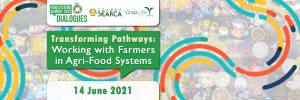Официальная обратная связь диалога для Саммита ООН по продовольственным системам 2021 года
Виды диалогов
Организатор
Язык диалога
Дата/время
Окончание
Город
Местоположение
Формат
Просьба ознакомиться с приводимыми ниже данными для получения регистрационной информации, если таковая имеется, или обратитесь к руководителю диалога, если желаете принять участие.
Куратор
Описание
At the core of poverty reduction, food security, and improved nutrition lies creating an environment that assures technology and its accompanying knowledge that can be used to facilitate the transformation of the agri-food systems. In the process of transformation, smallholder farmers need access to appropriate, affordable, profit-enhancing technologies and crop systems. However, it is essential that these technological interventions be sustainable and do not perpetuate the ecological degradation or social conditions so often seen in agricultural development.
In this environment is a mix of enablers, foremost of which are transformational leaders operating in change modalities appropriate to their local situations. These are composed of government institutions, research and development organizations, and private sector groups. How these key institutions create change in the farming community will depend on choosing the right modality to foster the change. The influencing conditions under which change is possible will also need to be put in place and often may include some of the following — access to appropriate (smallholder farmer-friendly) technologies, access to inputs (quality seed, fertilizers, pesticides, etc.), access to supporting institutional infrastructure and enabling policies, access to capital and insurance and access to markets and relevant information.
From these institutions, transformational leadership that combines an understanding of the potential in modern agricultural technology and knowledge, and their nuanced application to support sustainable food systems are considered important to the environment that will support change. SEARCA and CLA serve as a critical enabler to transforming these frontline “change agent” or extension worker that helps farmers modify their practices is empowering and requires beyond knowledge and skills — a certain mindset.
In this dialogue, the important aspect of what underpins the environment that must be created to support smallholder farmer change will be determined directly from the smallholder farmers. In particular, three breakout sessions will be conducted that focus on the UNFSS action tracks namely, 1 Action Track 1: Ensure access to safe and nutritious food for all; Action Track 3: Boost nature-positive production; and Action Track 5: Build resilience to vulnerabilities, shocks, and stress. Through these sessions, SEARCA and CLA will determine the actions from the government, academe, and private institutions to support farmers in the transformation towards sustainable agri-food systems.


